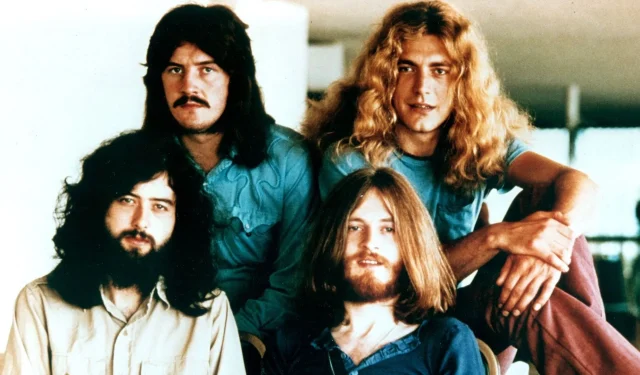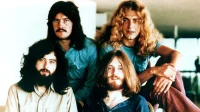Legendary rock band Led Zeppelin emerged in London, England, built from the remnants of the renowned group Yardbirds. After the Yardbirds disbanded in 1968, guitarist Jimmy Page went on to create Led Zeppelin. He was joined by vocalist Robert Plant, drummer John Bonham, and multi-instrumentalist John Paul Jones. Their debut album, simply titled Led Zeppelin, was released in 1969, showcasing a groundbreaking fusion of blues, hard rock, and acoustic elements that captivated audiences worldwide.
However, the band’s journey took a tragic turn in 1980 with the untimely death of Bonham. While other bands might have sought to continue, the remaining members of Zeppelin recognized Bonham’s integral role in defining their sound, particularly in live performances. Consequently, they deemed it impossible to replace him. This decision meant that despite a few sporadic reunions featuring various drummers, including Bonham’s son Jason, the legacy of one of history’s best-selling bands reached a definitive point. Nevertheless, the musical journeys of Plant, Page, and Jones continued to evolve.
Planting New Roots
A Frontman’s Next Chapter
Following Bonham’s passing, vocalist Robert Plant launched a successful solo career, starting with the 1982 release of Pictures at Eleven. He continued to diversify his discography with albums such as Now and Zen, Fate of Nations, Band of Joy, and Carry Fire. Although remnants of Zeppelin’s musical aesthetic may resonate throughout Plant’s solo work, he took the opportunity to delve into new genres, including synth-pop and African music. This exploratory phase meant it took several years before Plant reintroduced Zeppelin songs into his live performances.
Over the years, Plant collaborated with numerous artists. Notably, he worked with the iconic drummer Phil Collins both in the studio and on tour. Plant also formed various backing bands, such as Priory of Brion, Band of Joy, and the Sensational Space Shifters. His reunion with Jimmy Page in 1984 resulted in a supergroup alongside guitarist Jeff Beck called the Honeydrippers, and the duo later produced the album Walking into Clarksdale in 1998.
https://www.youtube.com/watch?v=1HAPGl-KPi0
Turning The Page
A Guitarist’s Influence
Guitarist Jimmy Page gradually embraced solo projects while grappling with the emotional impact of losing Bonham. He ventured into composing soundtracks for films, notably Death Wish II in 1982. Page collaborated on albums with various artists, from English singer-songwriter Roy Harper to former bandmate Plant. He formed supergroups such as The Firm, alongside Paul Rodgers, and revisited the Honeydrippers with Plant once more. Despite considering a collaboration with former Yes members called XYZ, no material was ever officially released.
Page’s first and only solo album, Outrider, debuted in 1988, featuring contributions from John Miles, Chris Farlowe, and Plant himself, with Jason Bonham on drums. While Outrider received lukewarm reviews, Page faced an uphill battle trying to replicate the extraordinary heights he achieved with Led Zeppelin, which are often cited as some of the most influential riffs in rock history.
https://www.youtube.com/watch?v=PD-MdiUm1_Y
Among Page’s notable later accomplishments was overcoming personal challenges, including a battle with addiction that affected his creativity and relationships. Today, while his activity in the music scene has diminished, Page’s legacy as Zeppelin’s unparalleled guitar icon remains firmly entrenched in rock history.
Keeping Up With Jones
The Multi-Instrumentalist’s Moment
For John Paul Jones, Led Zeppelin’s bassist and keyboardist, the loss of Bonham marked a pivotal turning point in his career. During the recording of Physical Graffiti, Jones contemplated leaving the band due to the demanding tour schedule. After Zeppelin’s disbandment, he continued to thrive in the music industry, collaborating with a diverse array of artists such as R.E.M., Lenny Kravitz, Paul McCartney, and many others.
In addition to his musical collaborations, Jones also ventured into music production, working with various bands and artists, including arranging albums for the Datsuns and Nickel Creek’s Sara Watkins. In 2009, he reunited with Dave Grohl to form the supergroup Them Crooked Vultures, further showcasing his versatility.
https://www.youtube.com/watch?v=FN9hzECDtUE
A multi-talented musician, Jones also released solo albums, such as Zooma (1999) and The Thunderthief (2001), showcasing his evolution as an artist. His contributions to music extend beyond rock, influencing genres and musicians alike, from the Red Hot Chili Peppers to Aerosmith. However, his remarkable legacy with Led Zeppelin will always stand out amongst his achievements, echoing the band’s unique sound that continues to resonate today.
Led Zeppelin’s combination of talent and innovation created a distinctive musical landscape that shape the genre of rock. Their groundbreaking legacy remains unparalleled, and the impact they’ve made since their inception in the 1960s continues to be felt profoundly in today’s music.


